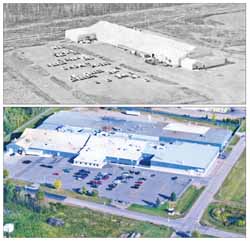
Amron Holding Open House Saturday to Mark 50 Years as Antigo Industry
The Amron Corporation is inviting the entire community to pay a visit to the Amron Avenue plant Saturday and help it and its parent companies, AMTEC and National Presto, celebrate the firm’s fifth decade in Antigo.
The open house runs from 9 a.m. to 11 a.m
“We want everyone to pay us a visit,” Doug Faragher, president of Amron explained, adding that it offers an unusual opportunity for the public to have access to the sprawling northside Antigo facility.
The Amron site got its start about 57 years ago as a particle board manufacturing plant for Wynnewood, a Dallas-based organization that had a number of similar factories in the U.S. making the wood product z gaining popularity in the construction trade.
But it simply didn’t work in Antigo, with management and equipment problems cited as contributing factors.
Finally, in 1967 Wynnewood pulled the plug here and one of the more stunning factory buildings went onto the market.
On Oct. 30, 1968, after speculation of what was in the works, Kenneth V. Tapper, who was then president of Amron, made the announcement that the firm was coming here, and rather quickly.

The Amron facilities in Antigo, looking much the same as they do today in the lower picture, but as they were very different in 1968 – 50 years ago – in the upper photo. Things have changed for the better on the city’s north side. An open house runs from 9 to 11 a.m. on Saturday marking the anniversary.
Work had been underway for weeks and the empty particle board plant was being filled with equipment to produce ordnance shells, millions of them.
Faragher explained that during the Vietnam War, demand for the M118 cartridge cases was great and the Army wanted a second source for the munitions at least 200 miles away from the existing plant in Waukesha.
“The empty particle board plant was perfect,” he said.
Things happened quickly, and by the end of the Vietnam War, Amron was producing 3 million M118 cases per month.
But demand for ordnance shells is cyclical and after the fall of Saigon, demand for the casings from Antigo ended and employment fell to a handful of people.
Other products were introduced and eventually the massive Waukesha site, that had more than 2,000 employees and covered 300,000 square feet of manufacturing space, was closed. Operations consolidated in Antigo.
Faragher said that after struggling, Amron had ownership changes and since Sept. 11, 2001, business and production steadily has increased.
“Contracts are currently extended into 2022,” he said.
During the half century since arrival of Tapper and Amron in 1968, Amron has far more than doubled the size of the original plant to reach 235,000 square feet. More updated and automated production equipment was installed and provided a platform for employment for the Antigo and Langlade County community.
Since purchasing the Antigo site in 2006, National Presto has invested nearly $44 million into facilities and equipment here.
Faragher said the number of people who have been with Amron since the very early days continues to be a source of satisfaction to the firm and certainly himself.
“We have proven the skilled men and women in Antigo produce excellent products,” he said, adding he and all of the people associated with AMTEC and Amron want to show and explain their successes with their friends and neighbors in Antigo.
“We invite you to attend Saturday,” he said, “it is a rare opportunity to see and experience an exceptional industrial production facility.”
Source: Antigo Daily Journal
